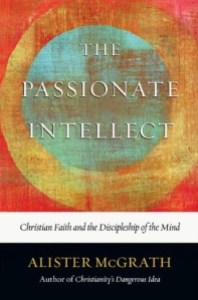Book Review: The Passionate Intellect


The Passionate Intellect: Christian Faith and the Discipleship of the Mind, Alister McGrath, Downers Grove: InterVarsity Press, 2010. Hardcover, 210 pages, $24.50
Back in the mid-1990s, I reviewed a book which began with the memorable words: “The scandal of the evangelical mind is that there is not much of an evangelical mind.” If you don’t recognize them, they’re from Mark Noll’s The Scandal of the Evangelical Mind. In the years since, many authors have echoed Noll’s lament. Others have sought to remedy the situation. The Passionate Intellect can be considered another attempt at rectifying the intellectual laziness of many Christians today. The author’s purpose is to do this with an eye to engaging challenges to the Christian faith in the public square.
McGrath is the author of many books and articles. He speaks widely at conferences around the world. Trained in molecular biophysics, chemistry, and theology, he’s currently the chair of theology, ministry and education of the Centre for Theology, Religion and Culture at King’s College, London, England. He is also the head of that institution. McGrath has served as an assistant pastor in an Anglican church and his wife is also an ordained Anglican minister.
The Passionate Intellect is based on previously unpublished lectures and addresses on the subjects of theology, apologetics, and cultural engagement. The first part of the book deals with “The Purpose, Place and Relevance of Christian Theology.” This is the better part of the book. One of the highlights is chapter 4, exploring the connections between Martin Luther and C. S. Lewis with regards to suffering and a “theology of the cross.” There are differences, but also some commonalities: “For all their differences, Lewis and Luther both believed that we dwell in a world of shadows, which will one day give way to the brilliance and clarity of heaven” (68). Both Luther and Lewis came to understand that the best theologians are forged in the furnace of suffering and hard experiences. If you were to buy this book, pay the most careful attention to this chapter.
The second part is titled, “Engaging With Our Culture,” and this section is more outwardly focussed and relates to apologetics. Here too, McGrath has some helpful and engaging points. For instance, I appreciated his critique of several aspects of the new atheism of Hitchens, Dawkins, etc. He describes his own personal journey to the discovery that atheism is a belief system rather than “a factual statement about reality” (106). He notes, “The new atheism conducts its polemic against a notion of God that bears little relation to that of Christianity” (111). He takes on Dawkins’ theory that “belief in God is a delusion caused by ‘memes.’” He identifies this theory as entirely based on speculation (115-118). Also, throughout the volume, McGrath correctly notes how Christianity offers the most “comprehensive, coherent, and compelling account of reality” of all worldviews and belief systems.
Yet I have some reservations that prevent a whole-hearted recommendation. First off, McGrath does not see Darwin’s evolutionary theory as being inconsistent with Christian belief. In a recent Clarion article with some colleagues, we argued quite the opposite. One cannot hold to Darwinian evolution and have a high view of Scripture. The two are mutually exclusive.
That brings me to a second reservation: how does McGrath view the relationship of Scripture to apologetics? It’s not clear to me from this book and that makes me uncomfortable. This is not to say that he ignores Scripture or biblical teachings. Rather, my reservation is with the fact that he does not come right out and say that the Bible must be the foundation for faithful Christian apologetics. Perhaps this is why we don’t hear anything from McGrath on the effects of sin on the human mind and reasoning and even imagination.
Finally, in chapter 10, McGrath portrays Jesus Christ as the ultimate pacifist: “He was the object, not the agent, of violence.” Wasn’t whipping money-changers out of the temple a bit on the violent side? Doesn’t he reveal himself in Revelation 19 as the rider on the white horse “who judges and makes war”? Revelation 19:15, “Out of his mouth comes a sharp sword with which to strike down the nations…He treads the winepress of the fury of the wrath of God Almighty.” McGrath asks, “Does the God and Father of our Lord Jesus Christ command anyone to kill in his name?” (156). Um…yes. Unless he is a Marcionite, McGrath should have Exodus 12 in his Bible. The LORD sends his angel to kill all the first-born of Egypt. There are other examples.
McGrath is at his best when dealing with Lewis and Luther. If the whole book was along the lines of chapter 4, I would be pleased to recommend it. Unfortunately, McGrath falls into a similar pit as Noll did in The Scandal of the Evangelical Mind. He sees the problems rightly, but his solutions are often lacking. The “passionate intellect” must be informed by Christian presuppositions firmly grounded only in the Word of God.




[…] other day I posted my review of Alister McGrath’s The Passionate Intellect. One thing I didn’t mention in this […]